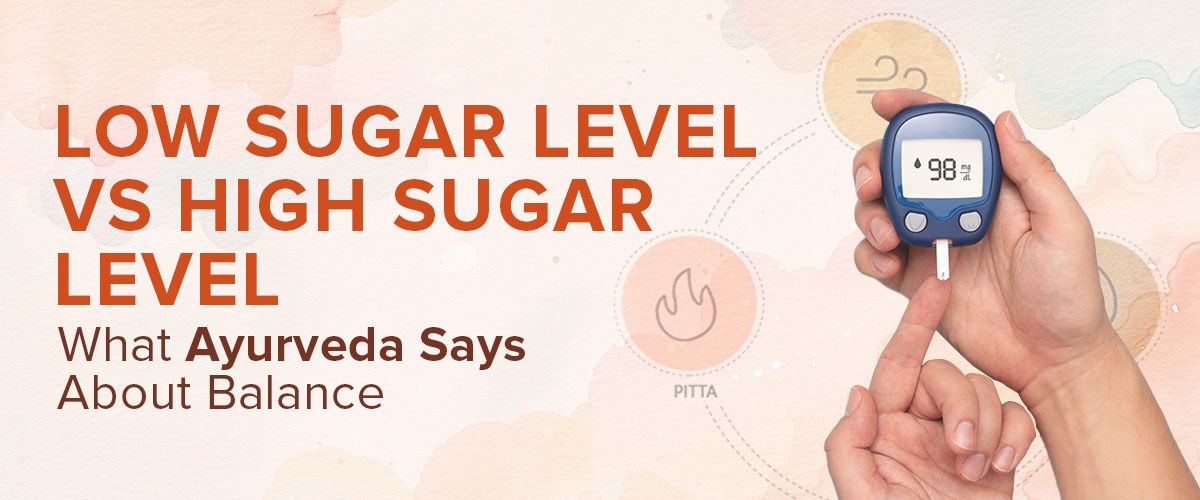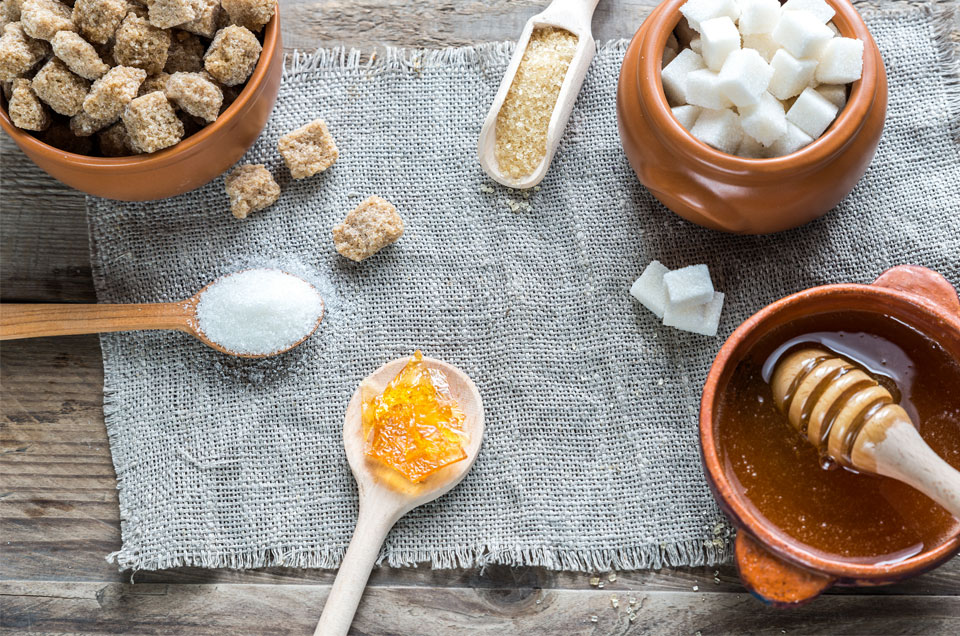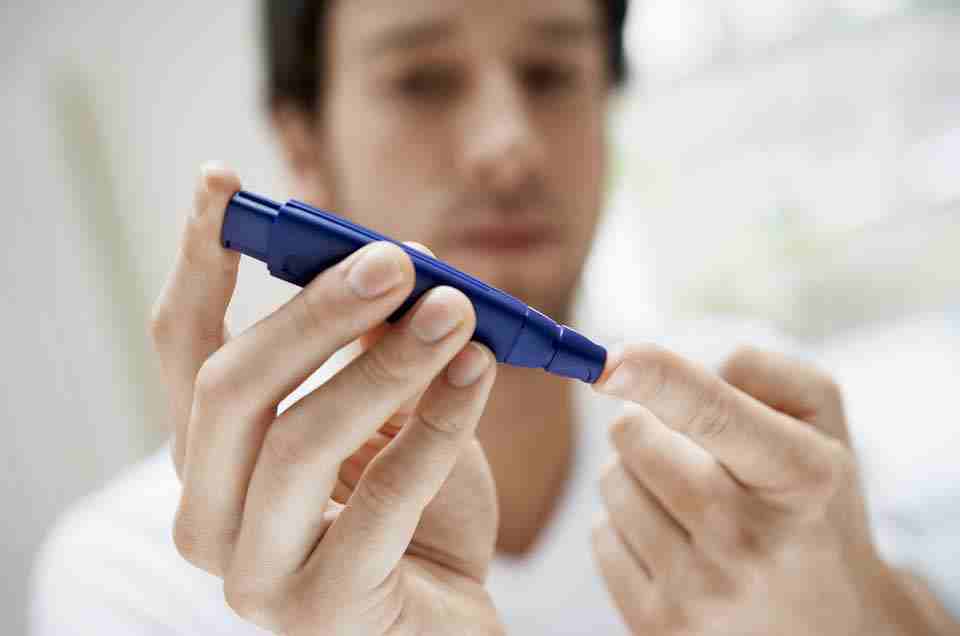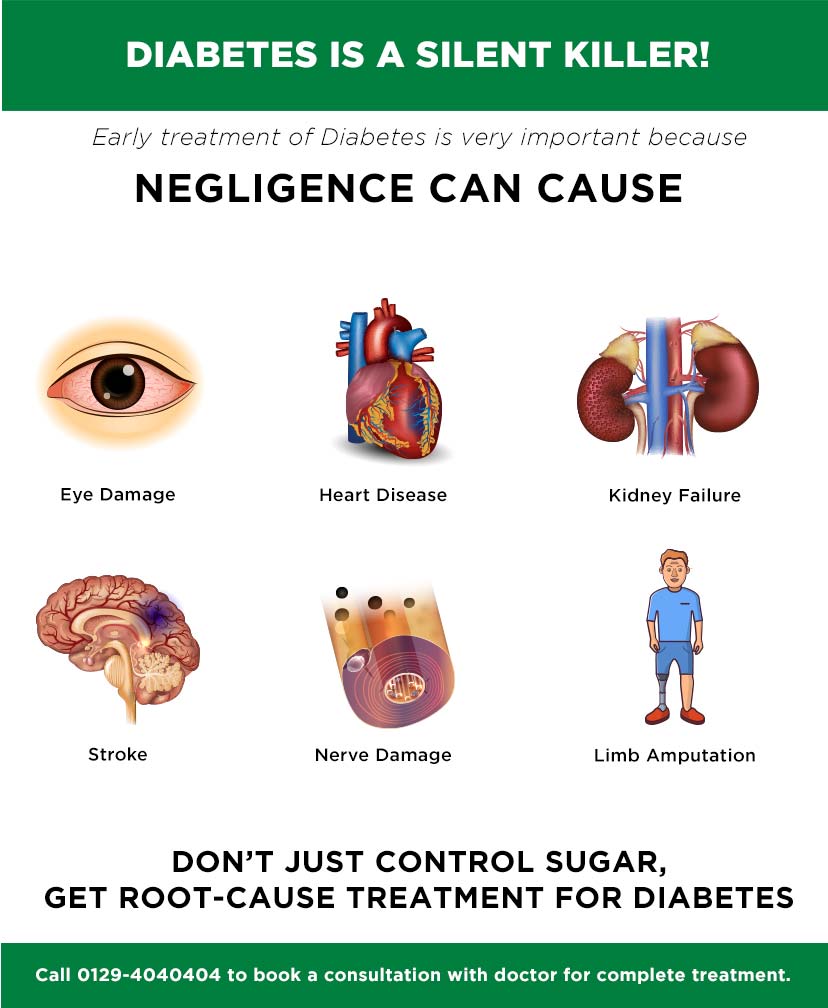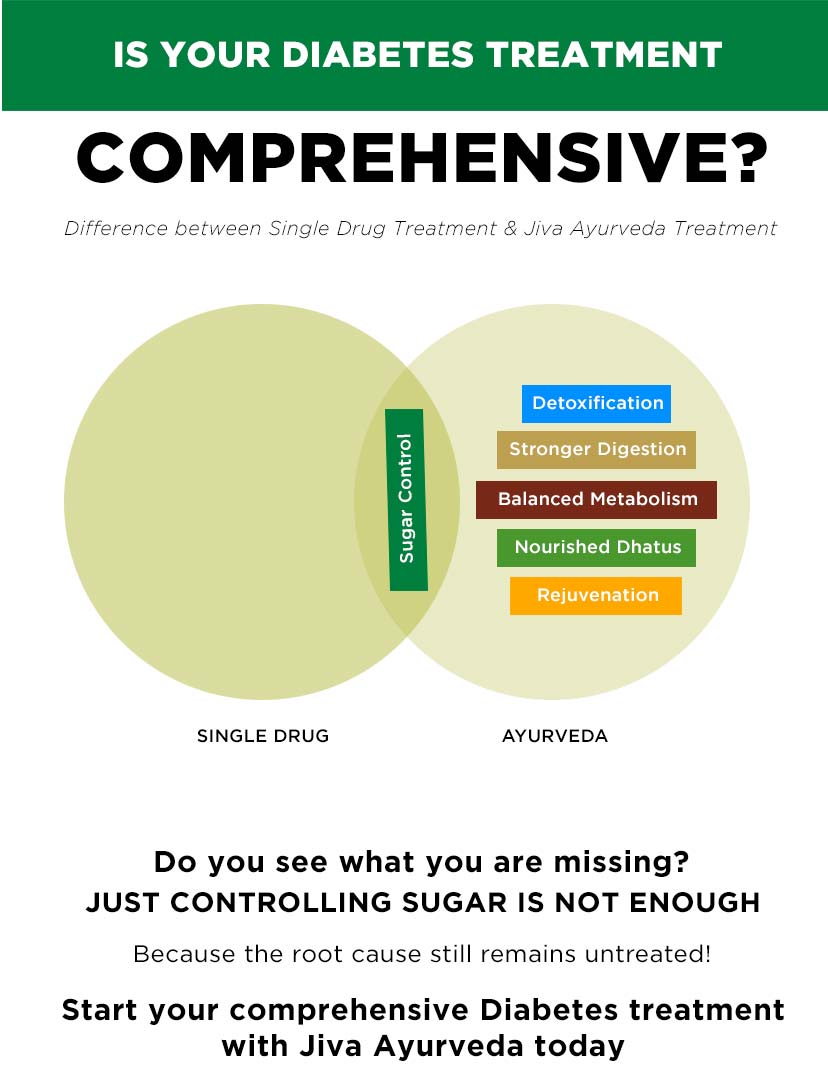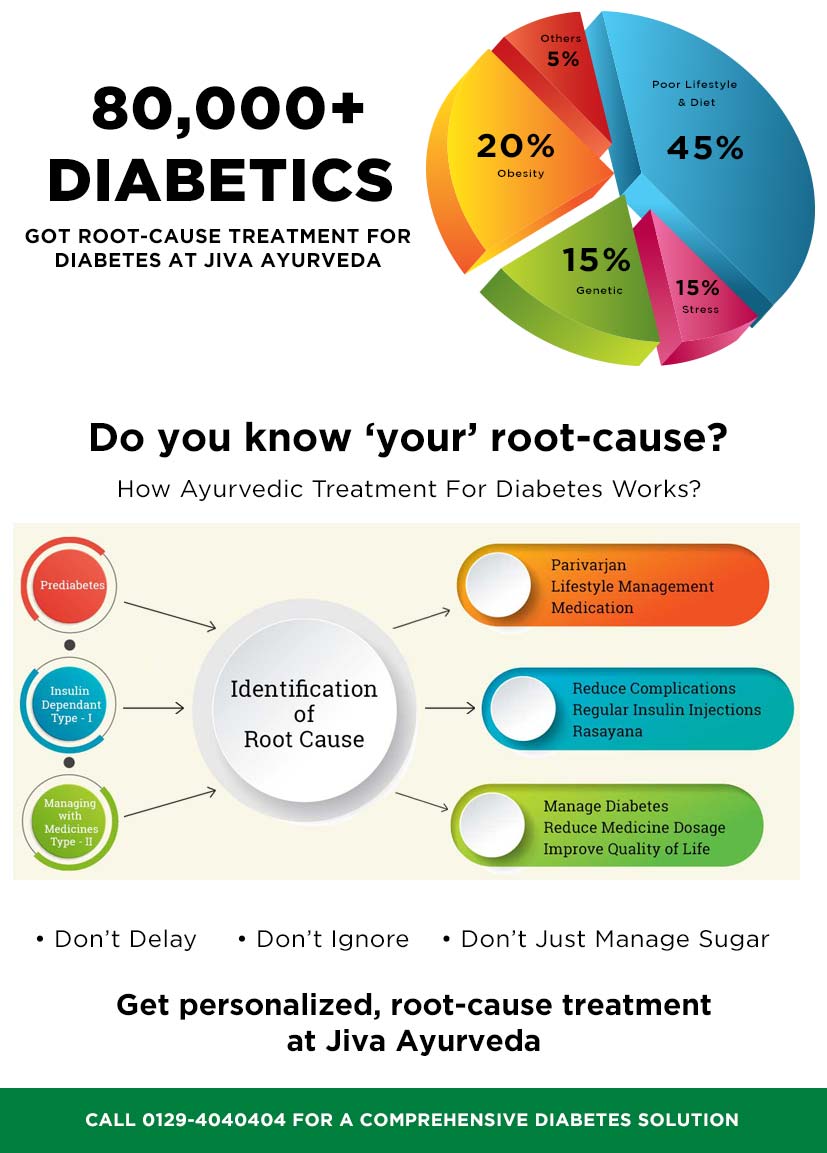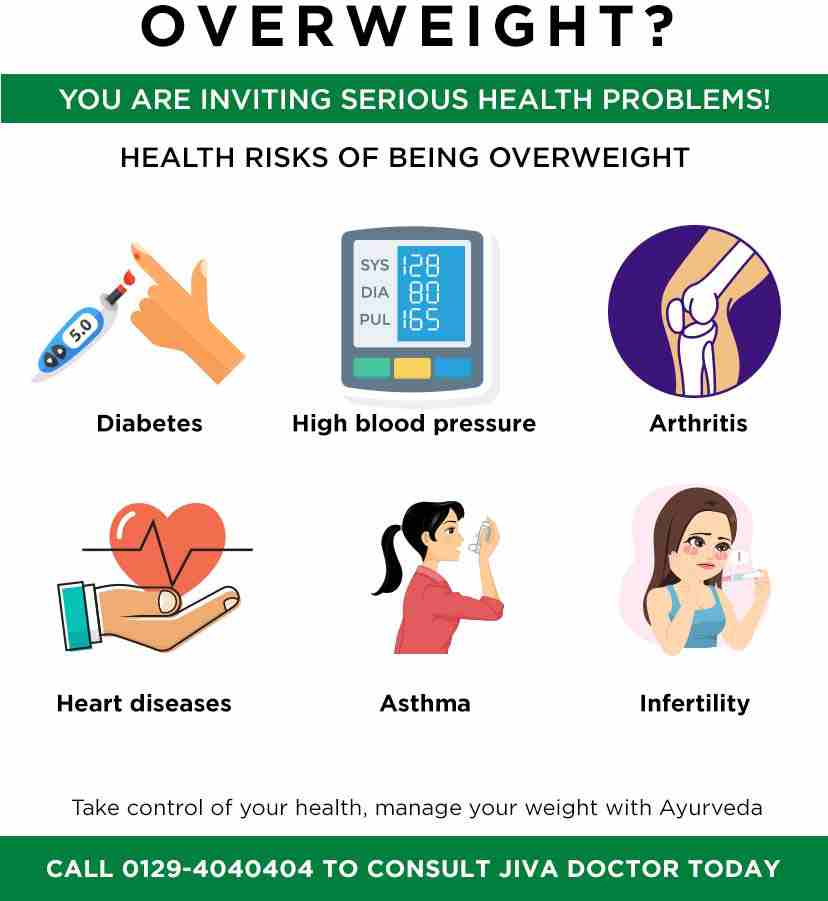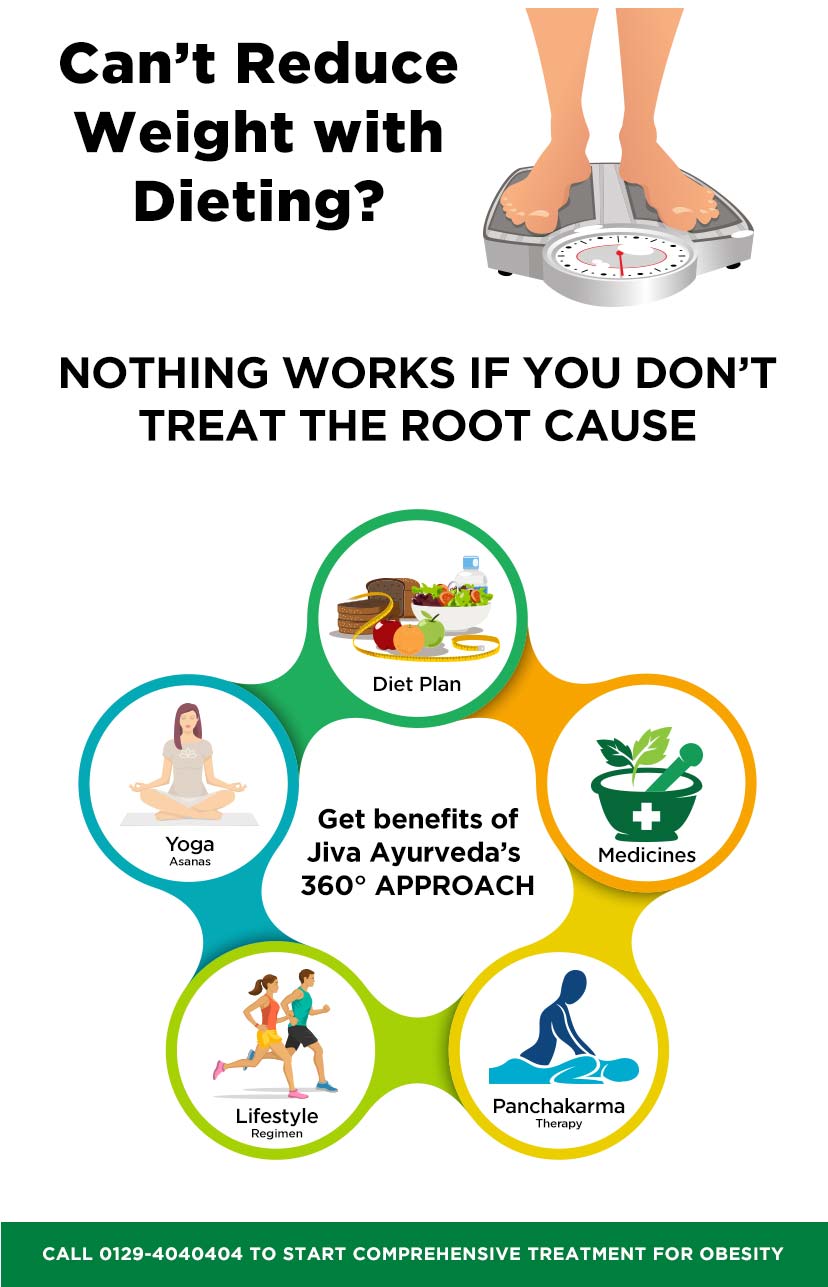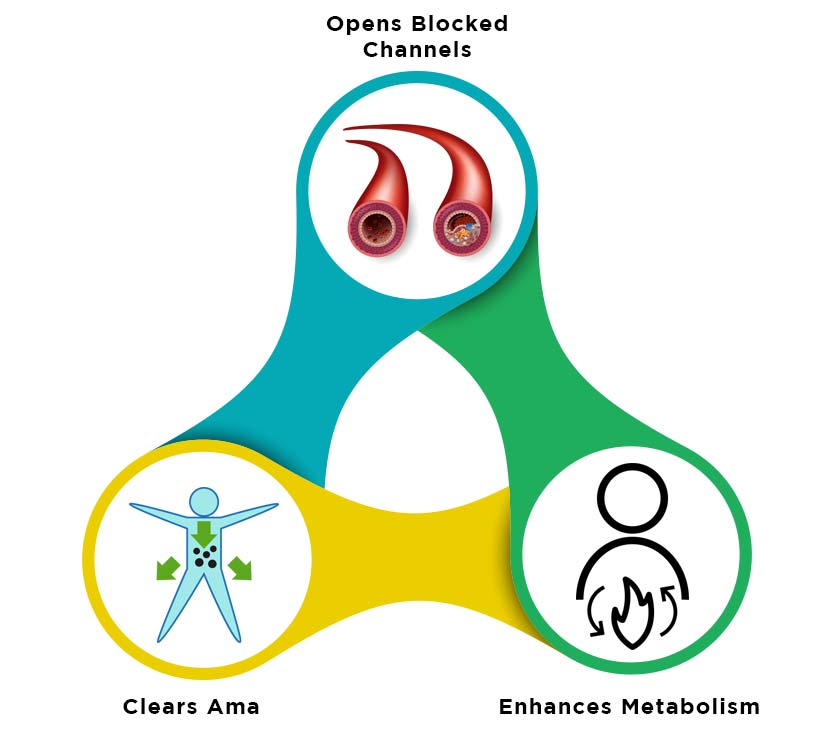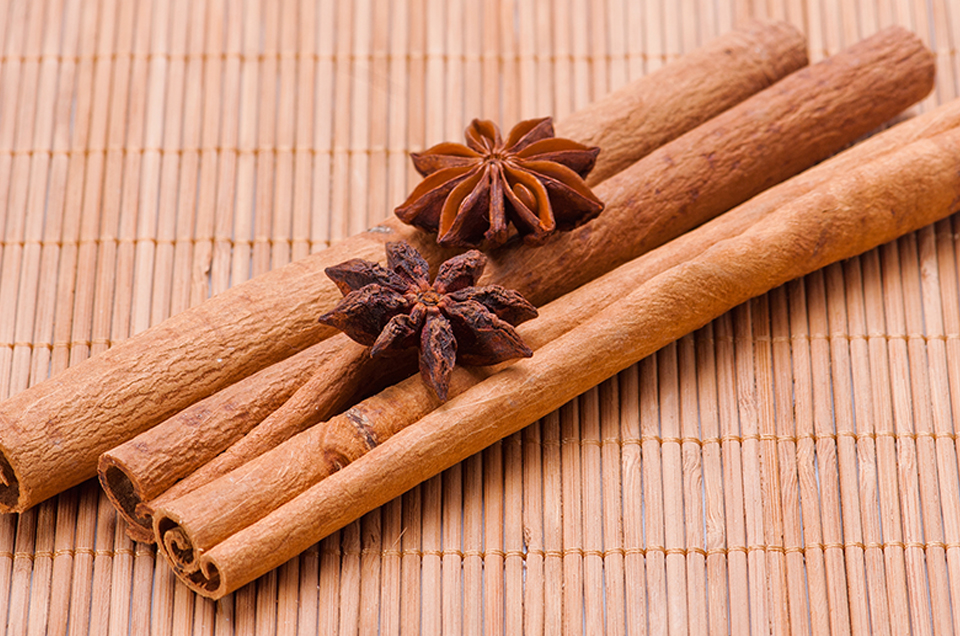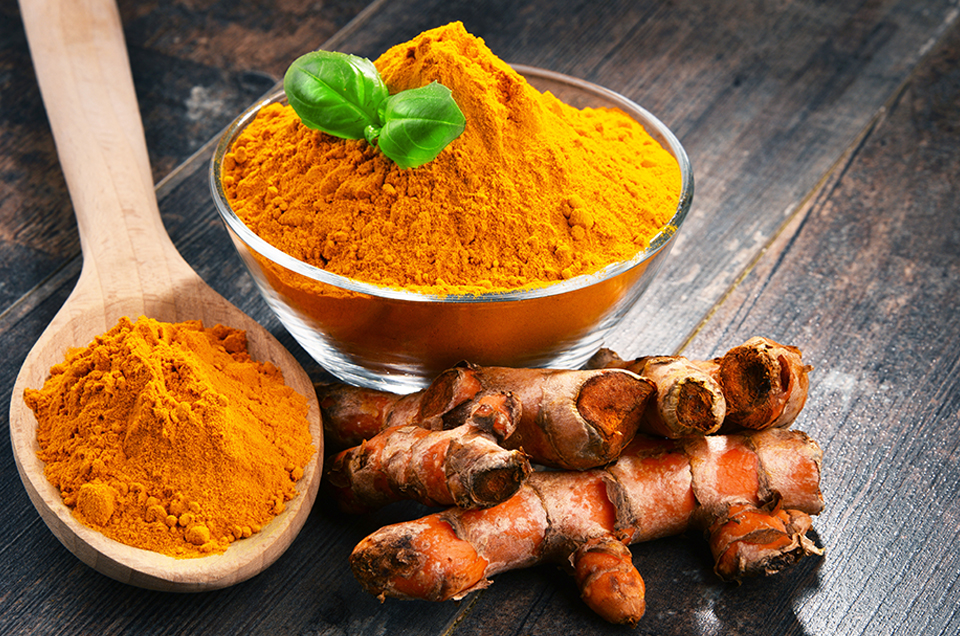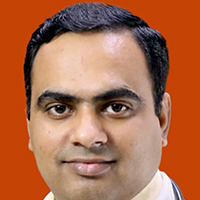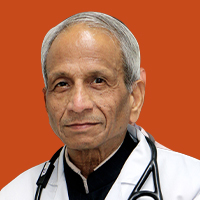In India, over 101 million adults are living with diabetes, and around 25 million are prediabetic, as reported by the World Health Organisation. This means almost one in 10 Indians are affected by this disease and most of them don’t even know it.
Blood sugar is an important sign of your complete health. If your sugar level is too high (hyperglycemia) or too low (hypoglycemia), this can cause symptoms like fatigue, blurred vision and eventually worse complications like heart problems and nerve damage. It is therefore essential to maintain your blood sugar in the prescribed range for fitness and a better lifestyle.
To help you with this, Ayurveda offers a complete solution to manage your blood sugar. In this blog, we will understand what Ayurveda thinks of high and low blood sugar, the causes and signs of each, and the natural remedies and lifestyle recommendations it suggests to help you balance your blood sugar.
What Are High and Low Blood Sugar Levels?
Let us understand this simply. Your body needs sugar or glucose for energy. The sugar in your blood comes mainly from food. It travels to your cells with the help of insulin, which is made by your pancreas. If your blood sugar is too high or too low, it may result in many health issues.
High blood sugar (Hyperglycemia)
This happens when there is too much sugar in your bloodstream. This usually means that your body isn't using insulin properly or not making enough insulin. You may notice signs like increased thirst, fatigue, hunger or frequent bathroom visits. If you don’t get this treated, high blood sugar can harm your eyes, nerves, kidneys, and heart.
Low blood sugar (Hypoglycemia)
If your blood glucose falls below normal range (which we have described in a table later), it's known as Hypoglycemia. This could happen when you miss meals, exercise too much, take a lot of insulin (for diabetics) or consume alcohol on an empty stomach. In this condition, you may feel shaky, dizzy, sweaty, confused or even faint.
Note: A normal fasting blood sugar ranges 70 to 100 mg/dL for almost all individuals. Anything over or below this range can lead to hypoglycemia or hyperglycemia.
What Are the Causes of High Blood Sugar?
When your body is not able to manage sugar correctly, you develop high blood glucose or hyperglycemia. Both modern medicine and Ayurveda provide explanations why this happens.
Modern Causes of High Blood Sugar
- Insulin resistance: Your body does not react to insulin properly, therefore sugar builds up in your bloodstream.
- Poor diet: If you eat too much sugar, refined cereals (like white rice, fried foods, white bread) or sugary drinks, this can spike your sugar levels quickly.
- Lack of physical activity: If you live a sedentary lifestyle, it becomes tough for your system to use sugar efficiently..
- Stress: If you take too much stress, your body produces hormones like cortisol which raises blood sugar.
- Obesity: Carrying extra weight around your belly also creates insulin resistance.
Ayurvedic Causes of High Blood Sugar
Kapha imbalance: If you eat excessive sweet, oily or heavy food, this can upset your Kapha.
Sedentary lifestyle: A lack of movement also aggravates Kapha.
Poor digestion (low Agni): A weak digestive fire can result in toxic accumulation and disturbance of sugar balance in your body.
What Causes Low Blood Sugar?
When your body does not have enough glucose for energy, this is called hypoglycemia. This can happen suddenly and requires urgent attention.
Modern Causes of Low Blood Sugar
- Skipping meals: If you do not eat regularly and on time, this can lower your sugar levels.
- Excess insulin or diabetes medicines: Taking too much insulin can lead to dangerously low sugar in diabetic patients.
- Intense physical activity: If you exercise regularly without eating enough, this can lower your sugar quickly.
- Drinking alcohol on an empty stomach: Alcohol prevents the release of stored sugar from your liver and causes hypoglycemia.
Ayurvedic Causes of Low Blood Sugar
- Vata imbalance: Ayurveda traces low sugar to excess Vata, which can be due to irregular meals, overworking or stress.
- Weak digestion: As per Ayurveda, weak digestion and poor nutrient absorption can also lower your blood sugar.
Pro Tip
You should always know what makes your sugar go up or down. Everyone’s body reacts differently. Start with a simple diary and record your meals, exercise, medication or stress. This small habit can help you and your Ayurvedic doctor spot patterns early, avoid emergencies and help you control your sugar more easily.
What Are the Types of Diabetes and How Does Ayurveda Classify Them?
As we have already understood, in diabetes, your body can not regulate your blood glucose. Therefore, it is important to understand the types of diabetes so you can manage it better.
Types of Diabetes as per Modern Medicine
- Type 1 Diabetes (Juvenile Diabetes): This type generally starts in your childhood or teen years. It happens when your immune system attacks and destroys insulin producing cells in the pancreas. Sugar can not enter your cells with no insulin, so your blood glucose levels become high. You will need to take insulin injections for a lifetime if you have Type 1 diabetes.
- Type 2 Diabetes: This is the most prevalent kind of diabetes, particularly among adults. In this, your body does not make enough insulin or your cells resist insulin. It's related to bad eating, no exercise, stress and obesity. The positive news is that with a change in lifestyle, Type 2 diabetes can usually be controlled or even reversed.
Ayurvedic Classification of Diabetes
Ayurveda considers diabetes as a disease characterised by Prameha ("excessive urination"). Ayurveda recognises 20 types of Prameha:
- 4 types caused by Vata dosha (Vata Prameha): These are mostly related to dryness, weight loss and weakness.
- 6 kinds caused by Pitta dosha: These show signs of heat, thirst and inflammation.
- 10 types caused by Kapha dosha (Kapha Prameha): These are associated with heaviness, sluggishness and obesity.
The most severe form of Prameha is Madhumeha (modern science calls it diabetes mellitus). Madhumeha occurs when your Vata is highly aggravated and sugar is passed in the urine.
What Are the Symptoms of High Sugar Levels?
If your blood sugar is above normal level, your body sends you several warning signs or symptoms. You should be able to recognise these signs of diabetes early to prevent serious problems.
Common Symptoms of High Sugar
Feeling very thirsty: You may feel an unquenchable thirst regardless of how much water you drink.
Frequent urination: You might want to use the restroom more frequently, particularly at nighttime.
More hunger: You might feel hungry even after eating because your body can not use sugar properly for producing energy.
Dry mouth: You may always feel dry or sticky feeling in your mouth.
Tiredness & fatigue: High sugar levels can make you feel unusually tired and weak all day.
Blurry vision: You might not be able to see clearly, and feel like there's a film over your eyes.
Wounds that heal slowly: If you get cuts, scrapes, or sores, you will see that they are not healing quickly.
Unexplained weight loss: Your body may start breaking down fat and muscle for energy and thus, you may lose weight suddenly.
Frequent infections: You might notice skin, gum, or bladder infections happening more often.
What Symptoms Does Low Sugar Have?
It is even more important to understand the signs of hypoglycemia as this condition can come on quickly and make you feel very ill.
Common Symptoms of Low Sugar
Dizziness or lightheadedness: You might feel like the room is spinning or you are about to faint.
Sweating: Even if it is cool outside, you might break out in sweat.
Shaking or trembling: Your hands and body may start shaking uncontrollably.
Hunger: You may want to eat something immediately.
Confusion: You may have difficulty thinking clearly or concentrating.
Irritability or mood swings: You might be easily annoyed or upset without any cause.
Blurred vision: As with high sugar, low sugar can affect your eyesight.
Weakness or fatigue: You might feel completely drained of energy and unable to do even daily tasks.
Palpitations: You may feel your heart beating faster than normal.
Pro Tip: Keep an extra small snack like nuts or fruit handy if you experience low sugar episodes. Such serious health risks can be prevented with quick action.
What Is the Normal Range for Blood Sugar ?
One of the best ways to manage and prevent diabetes is by measuring your blood sugar regularly. Basically, your blood sugar changes depending on what you eat, how physically fit you are and your complete health. Here, we have explained the sugar level chart age wise, so you know where you stand.
Normal Blood Sugar Levels for Healthy Individuals
If you do not have diabetes, your blood sugar should stay within these ranges:
|
Time of Test |
Normal Blood Sugar (mg/dL) |
|
Fasting (early morning, empty stomach) |
Less than 100 |
|
1 hour after meals |
90 to 130 |
|
2 hours after meals |
90 to 110 |
|
5 or more hours after eating |
70 to 90 |
Normal Sugar Level Chart Age Wise for People with Diabetes
If you have diabetes, your blood sugar targets are usually slightly higher. This helps avoid dangerous low sugar episodes.
|
Age Group |
Fasting |
Before Meals |
1-2 Hours After Meals |
Bedtime |
|
Under 6 years |
80 to 180 |
100 to 180 |
Around 180 |
110 to 200 |
|
6 - 12 years |
80 to 180 |
90 to 180 |
Up to 140 |
100 to 180 |
|
13 - 19 years |
70 to 150 |
90 to 130 |
Up to 140 |
90 to 150 |
|
20 years and above |
Less than 100 |
70 to 130 |
Less than 180 |
100 to 140 |
Normal Blood Sugar Levels for Pregnant Women (with Diabetes)
Pregnancy also changes how your body manages sugar. If you are pregnant and diabetic, your sugar levels should stay within these ranges:
|
Time of Test |
Normal Blood Sugar (mg/dL) |
|
Fasting |
70 to 89 |
|
Before meals |
Around 89 |
|
1-2 hours after meals |
Less than 120 |
|
Bedtime |
100 to 140 |
Normal Blood Sugar Levels for Prediabetics
Basically, prediabetes means you have a higher risk of developing diabetes. It’s a warning sign, but you still have time to take control.
|
Time of Test |
Prediabetic Range (mg/dL) |
|
Fasting |
100 to 125 |
|
2 hours after meals |
140 to 199 |
What are Ayurvedic Remedies for High Sugar Levels?
Ayurveda offers natural and safe methods to control your blood sugar. The Ayurvedic method of restoring balance in your body includes natural herbs, dietary changes, lifestyle modifications and detox therapies.
Herbal Remedies for High Sugar Levels
Ayurveda uses many powerful herbs to help your body control its sugars naturally.
Gudmar (Gymnema Sylvestre): This herb is called the "sugar destroyer". It helps to curb your sugar cravings and improves insulin function.
Neem: Neem is known to purify your blood and naturally lower your glucose level.
Bitter Gourd (Karela): Karela acts like a natural insulin to help your body absorb and use sugar better.
Turmeric (Curcumin): Its anti-inflammatory properties improve your body’s insulin sensitivity and prevent sugar spikes.
Fenugreek (Methi): Methi is rich in fibre and slows the absorption of sugar into your bloodstream.
Amla (Indian Gooseberry): Amla is full of Vitamin C and antioxidants. It helps your pancreas work better and manage your sugar level.
Cinnamon: A simple kitchen spice that helps your body use insulin better.
Pro Tip: Consult an Ayurvedic expert before taking any herbal remedies, so you can get the proper dose based on your specific problem and body constitution.
Ayurvedic Diet Suggestions
As per Ayurveda, what you eat daily can also affect your blood sugar. Ayurveda recommends:
- Whole grains (like oats millet, barley) in place of white rice and refined flour.
- Leafy green vegetables and bitter vegetables (spinach, bitter gourd, fenugreek leaves, drumsticks) to balance excess Kapha in your body.
- Good proteins from lentils, beans and nuts.
- Herbs and spices like cinnamon, turmeric and cumin for better digestion and sugar control.
- Avoid sugary and fried foods, white rice and white sugar, which can spike your sugar level.
- Eating smaller and balanced meals throughout the day helps you keep up energy levels.
Lifestyle Changes to Help Balance Sugar Levels
Ayurveda also talks about lifestyle balance for sugar control. These include:
Yoga: Regular practice of asanas for ex. Surya Namaskar, Vajrasana and Paschimottanasana can improve your insulin sensitivity and blood flow.
Pranayama (breathing exercises): Simple practices like Anulom Vilom and Kapalbhati can calm your mind and lower blood sugar.
Stress management: According to Ayurveda, stress weakens your digestion and raises sugar in your body. Daily meditation, deep breathing and a calm routine can keep you balanced.
Panchakarma Therapy for Blood Sugar Control
Panchakarma is Ayurveda's special detox therapy to rid your body of toxins and to balance your doshas.
Virechana (therapeutic purging): Cleanses your liver and reduces excess Pitta and toxins.
Basti (medicated enema): Controls Vata and improves digestion and sugar control.
Swedana (herbal steam): Improves circulation & corrects Kapha imbalance.
Conclusion
Diabetes doesn’t have to control your life. If you're worried about high sugar spikes or sudden low sugar crashes, then first of all, take a step back and understand your body. With Ayurveda, you get a natural, holistic way to balance your sugar levels and that too with permanent fixes. With some basic knowledge and small, daily efforts, you can bring your health back to your best years.
You deserve to feel energetic, calm, and healthy everyday. If you have any doubts or need a personalised consultation, call our certified Jiva doctors at 0129-4264323 and get expert advice for all your health concerns.
FAQs
Is a blood sugar level of 400 dangerous?
Yes, a blood sugar of 400 mg/dL is considered unsafe. It could cause severe diseases including diabetic ketoacidosis (DKA) and coma in case it is not managed quickly. If your blood sugar hits this level, get medical help. Avoid exercising, which can worsen the situation. Instead, rest and follow your Ayurvedic doctor's orders.
Does jaggery increase sugar level?
Yes, Jaggery can raise blood sugar. Even though less processed than white sugar, jaggery has a high glycemic index, and that could mean it can spike blood glucose rapidly. Avoid or limit jaggery if you have diabetes or are watching your sugar intake.
Does sugarcane increase sugar level?
Yes, sugarcane juice has natural sugars that can spike your blood sugar. It is not recommended for individuals with diabetes or who wish to manage their sugar consumption. Sugarcane juice can also spike your blood sugar to extreme levels.
What immediately lowers blood sugar?
To rapidly lower high blood sugar, drink water to eliminate excess glucose and do light physical activity like walking to lower blood sugar. But if your blood sugar is extremely high, you need to still consult an Ayurvedic doctor instead of using these methods alone.
What is the Ayurveda way of reversing pre-diabetes?
Ayurveda recommends a balanced diet to reverse pre-diabetes, including plenty of whole grains, bitter herbs and vegetables (turmeric,amla,etc.). Regular physical activity, stress management with yoga and meditation and detoxification therapies like Panchakarma are also recommended. For individualised guidance, consult an Ayurvedic practitioner.
What should be the blood sugar for ages 50-70?
A normal fasting blood sugar value is 70 to 99 mg/dL for people aged 50 to 70. Post-meal (2 hours after eating) levels must not exceed 140 mg/dL. But because targets can vary by health condition, consult your Ayurvedic doctor based on your customised goals.



